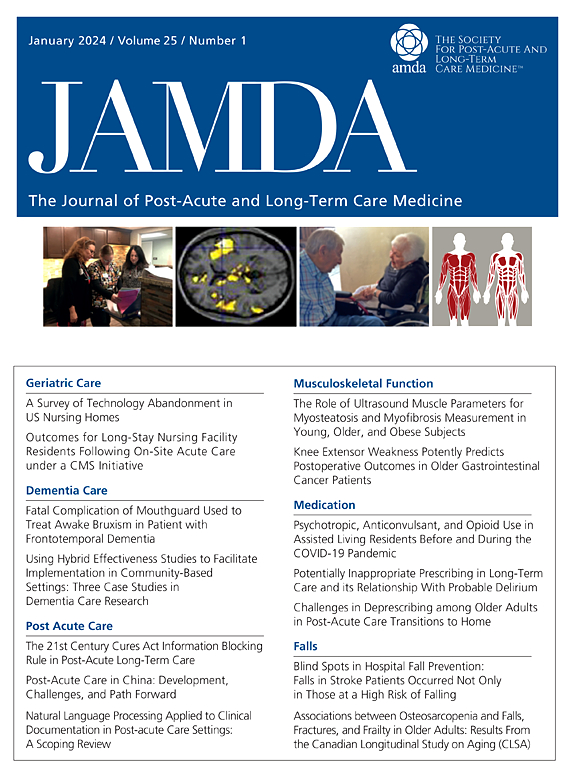简单吞咽训练计划对社区老年人早期口咽吞咽困难的影响:随机对照研究
IF 4.2
2区 医学
Q2 GERIATRICS & GERONTOLOGY
Journal of the American Medical Directors Association
Pub Date : 2024-10-09
DOI:10.1016/j.jamda.2024.105297
引用次数: 0
摘要
目的:社区老年人口咽吞咽困难(OD)由于起病隐匿,一直是一个难题。本研究针对这些问题开发了简单吞咽训练计划(SSTP),并进行了随机对照试验,以探讨其对吞咽功能和生活质量的影响:设计:双臂随机对照试验:参与者2024年,共有248名患有OD的社区老年人被纳入其中,并随机分为干预组和对照组:通过专家咨询制定了SSTP。方法:SSTP 是通过专家咨询制定的,2024 年共纳入 248 名患有 OD 的社区老年人,随机分为干预组和对照组。干预组每天进行两次 SSTP,持续 21 天,周末休息,对照组参与者自行进行轻度体育活动。主要结果是吞咽筛查(GUSS),次要结果是进食评估工具-10(EAT-10)、吞咽生活质量问卷(SWAL-QoL)、最大舌压、咀嚼能力、咬合力和进餐时间。评估在第 1 天和第 21 天进行,每 3 天对午餐进餐时间进行一次评估:结果:27 名参与者中途退出。基线评估结果无明显差异(P > .05)。在 GUSS 中存在明显的组间效应和交互效应[(19.07 ± 1.38) vs (17.28 ± 2.17),Fbetween-group = 6.893,Pbetween-group = .009,Finteractive = 59.504,Pinteractivebetween-group = -3.502,Pbetween-groupinteractive = -6.252,Pinteractivebetween-group = 2.681,Pbetween-group = .007;zinteractive = 5.475,Pinteractivebetween-group=3.377,Pbetween-group=.001;zinteractive=-6.208,Pinteractivebetween-group=4.801,Pbetween-groupinteractive=6.979,Pinteractivebetween-group=8.692,Pbetween-group=.004,Ftime=138.683,Ptime<0.001,Pinteractive=73.196,PinteractiveConclusions and implications:SSTP 可有效改善社区老年人的早期 OD 和与吞咽相关的生活质量。本文章由计算机程序翻译,如有差异,请以英文原文为准。
Effect of Simple Swallowing Training Program on Early Oropharyngeal Dysphagia in Community-Dwelling Older Adults: A Randomized Controlled Study
Objectives
Oropharyngeal dysphagia (OD) in community-dwelling older adults continues to be a challenge due to its insidious onset. This study developed a simple swallowing training program (SSTP) to address these issues and conducted a randomized controlled trial to explore its effect on swallowing function and quality of life.
Design
Two-arm randomized controlled trial.
Setting: and Participants
A total of 248 community-dwelling older adults with OD from were included in 2024 and randomly divided into intervention and control groups.
Methods
The SSTP was developed through expert consultation. A total of 248 community-dwelling older adults with OD were included in 2024 and randomly divided into intervention and control groups. The intervention group underwent the SSTP twice daily for 21 days, with weekends off, and the control group participants did light physical activities by themselves. The primary outcome was the Gugging Swallowing Screen (GUSS), and the secondary outcomes were the Eating Assessment Tool-10 (EAT-10), Swallowing Quality of Life questionnaire (SWAL-QoL), maximum tongue pressure, masticatory ability, bite force, and meal duration. Assessments were conducted on days 1 and 21, while meal duration was assessed every 3 days for lunch.
Results
Twenty-seven participants withdrew halfway. There were no significant differences in baseline assessments (P > .05). There were significant between-group and interactive effects in the GUSS [(19.07 ± 1.38) vs (17.28 ± 2.17), Fbetween-group = 6.893, Pbetween-group = .009, Finteractive = 59.504, Pinteractive<.001], EAT-10 {[4.00 (3.00, 5.00)] vs [9.00 (7.00, 10.00)], zbetween-group = −3.502, Pbetween-group<.001; zinteractive = −6.252, Pinteractive<.001}, SWAL-QoL {[166.00 (163.00, 171.50)] vs [154.00 (150.00, 158.00)], zbetween-group = 2.681, Pbetween-group = .007; zinteractive = 5.475, Pinteractive<.001}, maximum tongue pressure {[33.10 (26.48, 36.86)] vs [28.85 (19.21, 35.77)], zbetween-group = 3.377, Pbetween-group = .001; zinteractive = −6.208, Pinteractive<.001}, masticatory ability {[176.92 (133.10, 212.91) vs [163.33 (116.66, 189.32)], zbetween-group = 4.801, Pbetween-group<.001; zinteractive = 6.979, Pinteractive<.001}. Between-group, time, and interactive effects were significant in the meal duration [(23.39 ± 4.32) vs (27.64 ± 5.63), Fbetween-group = 8.692, Pbetween-group = .004, Ftime = 138.683, Ptime< 0.001, Pinteractive = 73.196, Pinteractive<.001].
Conclusions and Implications
The SSTP can effectively improve early OD and swallowing-related quality of life in community-dwelling older adults.
求助全文
通过发布文献求助,成功后即可免费获取论文全文。
去求助
来源期刊
CiteScore
11.10
自引率
6.60%
发文量
472
审稿时长
44 days
期刊介绍:
JAMDA, the official journal of AMDA - The Society for Post-Acute and Long-Term Care Medicine, is a leading peer-reviewed publication that offers practical information and research geared towards healthcare professionals in the post-acute and long-term care fields. It is also a valuable resource for policy-makers, organizational leaders, educators, and advocates.
The journal provides essential information for various healthcare professionals such as medical directors, attending physicians, nurses, consultant pharmacists, geriatric psychiatrists, nurse practitioners, physician assistants, physical and occupational therapists, social workers, and others involved in providing, overseeing, and promoting quality

 求助内容:
求助内容: 应助结果提醒方式:
应助结果提醒方式:


